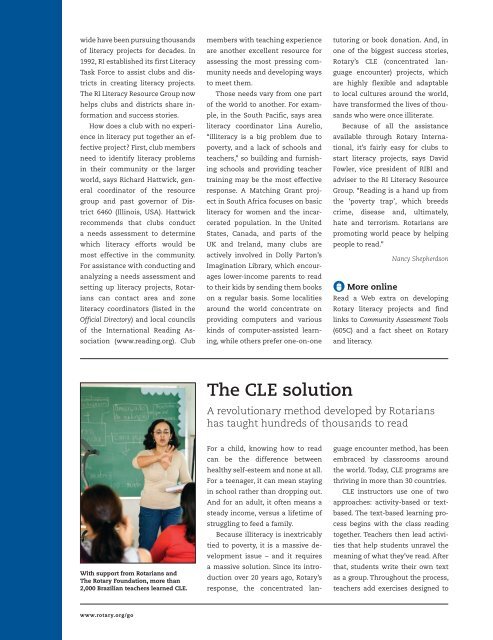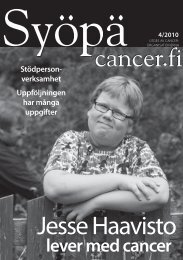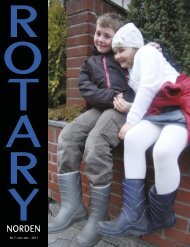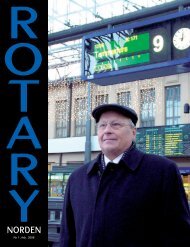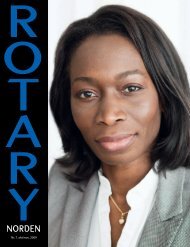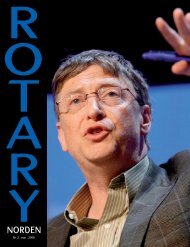You also want an ePaper? Increase the reach of your titles
YUMPU automatically turns print PDFs into web optimized ePapers that Google loves.
wide have been pursuing thousands<br />
of literacy projects for decades. In<br />
1992, RI established its first Literacy<br />
Task Force to assist clubs and districts<br />
in creating literacy projects.<br />
The RI Literacy Resource Group now<br />
helps clubs and districts share information<br />
and success stories.<br />
How does a club with no experience<br />
in literacy put together an effective<br />
project? First, club members<br />
need to identify literacy problems<br />
in their community or the larger<br />
world, says Richard Hattwick, general<br />
coordinator of the resource<br />
group and past governor of District<br />
6460 (Illinois, USA). Hattwick<br />
recommends that clubs conduct<br />
a needs assessment to determine<br />
which literacy efforts would be<br />
most effective in the community.<br />
For assistance with conducting and<br />
analyzing a needs assessment and<br />
setting up literacy projects, Rotarians<br />
can contact area and zone<br />
literacy coordinators (listed in the<br />
Official Directory) and local councils<br />
of the International Reading Association<br />
(www.reading.org). Club<br />
With support from Rotarians and<br />
The Rotary Foundation, more than<br />
2,000 Brazilian teachers learned CLE.<br />
www.rotary.org/go<br />
members with teaching experience<br />
are another excellent resource for<br />
assessing the most pressing community<br />
needs and developing ways<br />
to meet them.<br />
Those needs vary from one part<br />
of the world to another. For example,<br />
in the South Pacific, says area<br />
literacy coordinator Lina Aurelio,<br />
“illiteracy is a big problem due to<br />
poverty, and a lack of schools and<br />
teachers,” so building and furnishing<br />
schools and providing teacher<br />
training may be the most effective<br />
response. A Matching Grant project<br />
in South Africa focuses on basic<br />
literacy for women and the incarcerated<br />
population. In the United<br />
States, Canada, and parts of the<br />
UK and Ireland, many clubs are<br />
actively involved in Dolly Parton’s<br />
Imagination Library, which encourages<br />
lower-income parents to read<br />
to their kids by sending them books<br />
on a regular basis. Some localities<br />
around the world concentrate on<br />
providing computers and various<br />
kinds of computer-assisted learning,<br />
while others prefer one-on-one<br />
The CLE solution<br />
For a child, knowing how to read<br />
can be the difference between<br />
healthy self-esteem and none at all.<br />
For a teenager, it can mean staying<br />
in school rather than dropping out.<br />
And for an adult, it often means a<br />
steady income, versus a lifetime of<br />
struggling to feed a family.<br />
Because illiteracy is inextricably<br />
tied to poverty, it is a massive development<br />
issue – and it requires<br />
a massive solution. Since its introduction<br />
over 20 years ago, Rotary’s<br />
response, the concentrated lan-<br />
tutoring or book donation. And, in<br />
one of the biggest success stories,<br />
Rotary’s CLE (concentrated language<br />
encounter) projects, which<br />
are highly flexible and adaptable<br />
to local cultures around the world,<br />
have transformed the lives of thousands<br />
who were once illiterate.<br />
Because of all the assistance<br />
available through Rotary International,<br />
it’s fairly easy for clubs to<br />
start literacy projects, says David<br />
Fowler, vice president of RIBI and<br />
adviser to the RI Literacy Resource<br />
Group. “Reading is a hand up from<br />
the ‘poverty trap’, which breeds<br />
crime, disease and, ultimately,<br />
hate and terrorism. Rotarians are<br />
promoting world peace by helping<br />
people to read.”<br />
Nancy Shepherdson<br />
More online<br />
Read a Web extra on developing<br />
Rotary literacy projects and find<br />
links to Community Assessment Tools<br />
(605C) and a fact sheet on Rotary<br />
and literacy.<br />
A revolutionary method developed by Rotarians<br />
has taught hundreds of thousands to read<br />
guage encounter method, has been<br />
embraced by classrooms around<br />
the world. Today, CLE programs are<br />
thriving in more than 30 countries.<br />
CLE instructors use one of two<br />
approaches: activity-based or textbased.<br />
The text-based learning process<br />
begins with the class reading<br />
together. Teachers then lead activities<br />
that help students unravel the<br />
meaning of what they’ve read. After<br />
that, students write their own text<br />
as a group. Throughout the process,<br />
teachers add exercises designed to


